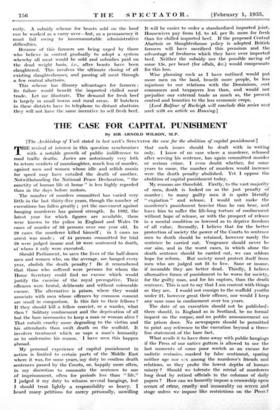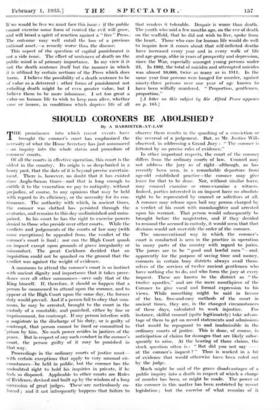THE CASE FOR CAPITAL PUNISHMENT
By SIR- ARNOLD WILSON, M.P.
[The Archbishop of York stated in last week's SPECTATOR the case for the abolition of capital punishment.] THErevival of interest in this question synchnizes. ro with a notable growth of public indifference to road traffic deaths. Juries are notoriously very loth to return verdicts of manslaughter, much less of murder," against men and women whose idle and selfish mania for speed may have entailed the death of another. Notwithstanding the National Peace Declaration, " the sanctity of human life at home " is less highly regarded than in the days before motors.
The number of murders committed has varied very little in the last thirty-five years, though the number of executions has fallen greatly ; yet the movement against hanging murderers has gained strength. In 1932, the latest year for which figures are available, there were known to the police in England and Wales 78 cases of murder of 93 persons over • one year old. In 28 cases the murderer • killed himself ; in 5 cases no arrest was made ; of 44 persons- committed for trial 28 were judged insane and 10 Were sentenced to death; of whom 4 only were executed.
Should Parliament, to save the lives of the half-dozen men and women who, on the average, are hanged every year, abolish the death penalty ? Be it remembered that those who suffered were persons for whom the Home Secretary could find no excuse which would justify the exercise of the royal prerogative. Their offences were brutal, deliberate and without • colourable excuse. The alternative is prison, where they would associate with men whose offences by common consent are small in comparison. Is this fair to their fellows ? If they should kill a felloW convict, or a warder, what then ? Solitary' confinement and the deprivation of all but the bare necessaries to keep a man or woman alive ? That entails cruelty more degrading to the victim and his attendants than swift death on the scaffold. It involves treatment which so Saps a man's humanity as to undermine his reason. - I have seen this happen abroad.
My personal experience of capital punishment in action is limited to certain parts of the •Middle East where it was, for some years; my duty to confirm death sentences passed by the Courts, or, happily more often, in my discretion to commute the sentence to one of imprisonment, often for periods less than " life." I judged it my duty to witness several hangings, lest I should treat lightly a responsibility so heavy. I heard many petitions for mercy personally, unwilling that such issues should be dealt with in writing only. I know of no case where a murderer, released after serving his sentence, has again committed murder or serious crime. I even doubt whether, for sonic years to come, the number of murders would increase were the death penalty abolished. Yet I oppose the abolition of capital punishment today.
My reasons are threefold. Firstly, to the vast majority of men, death is looked on as the just penalty of murder : to many guilty men it is quite literally " expiation " and release. I would not make the murderer's punishment heavier than he can bear, and leave him to suffer the life-long torture of confinement without hope of release, or with the prospect of release in a mental condition so lowered as to deprive freedom of all value. Secondly, I believe that for the better protection of society the power of the Courts to sentence men to death should be retained, however rarely the sentence be carried out. Vengeance should never be our aim, and in the worst cases, in which alone the death sentence should be carried out, we can seldom hope for reform. But society must protect itself from men who are judged not fit to live. Sane or insane, if incurable they are better dead. Thirdly, I believe alternative forms of punishment to be worse for society, for the guilty man, and for his captors, than the death sentence. This is not to say that I am content with things as they are. I would not consign to the scaffold youths under 21, however great their offence, nor would I keep any sane man in confinement over ten years.
The date of an execution should not be published : there should, in England as in Scotland, be no formal inquest on the corpse, and no public announcement on the prison door. No newspapers should be permitted to print any reference to the execution beyond a three- line statement,of the bare fact.
What avails it to have done away with public hangings if the Press of our native gutters is allowed to use the last moments of some poor wretch as an excuse for sadistic ecstasies, masked by false sentiment, sparing neither age nor S3X among the murderer's friends and relations, as they probe the lowest depths of human misery ? Should we tolerate the retrial of murderers long dead by retired officials in the columns of daily papers ? How can we honestly impose a censorship upon scenes of crime, cruelty and immorality on screen and stage unless we impose like restrictions on the Press ? If we would be free we must face this issue : if the -public cannot etercise--some form. of Control the evil will grow,. and wilt breed-a spirit of reaction against a " free " Press.) The outeotoe' may well entail the- loss- of a precious, national asset,a remedy worse than the disease.
This aspect of the question of capital punishment is not a side issue. The effect of sentences- of death on the public. Mind is of primary importanee. In my view it is. not the. death sentence itself but the manner in which it is utilized by'eertain sections of the Press which does- -harin. I believe the possibility of a death sentence to be of value as a 'deterrent : other forms of punishment not entailing death might be of even greater value, but I belieVe them to be more inhUmane. I set too great a value on human life to wish to keep men alive, whether ane or insane, in 'conditions which deprive life of all that renders it tolerable.- Despair is worse than death. The youth who said a few months ago, on the eve of death on the scaffold, • that he did not wish to live, spoke from the heart. Those who care for human life would do well to inquire how. it comes about that self-inflicted- deaths have increased every year and in every walk of life and age-group, alike in years of prosperity and depression, since the War, especially amongst young persons under 25. In 1982, the total of suicides and attempted suicides- was almost 10,000, twice as many as in 1911. In the same year four persons were hanged for murder, against ninety-three persons over one year of age known to have been- wilfully Murdered. " Proportion, gentlemen, proportion."
• [A letter on this subject by Sir Alfred Pease appears on p. 1651















































 Previous page
Previous page